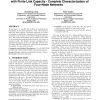60 search results - page 4 / 12 » Self-stabilizing byzantine agreement |
CORR
2008
Springer
13 years 7 months ago
2008
Springer
Consider an asynchronous system with private channels and n processes, up to t of which may be faulty. We settle a longstanding open question by providing a Byzantine agreement pr...
SSS
2005
Springer
14 years 28 days ago
2005
Springer
Awareness of the need for robustness in distributed systems increases as distributed systems become integral parts of day-to-day systems. Self-stabilizing while tolerating ongoing ...
CRYPTO
2006
Springer
13 years 11 months ago
2006
Springer
In a seminal paper, Feldman and Micali (STOC '88) show an n-party Byzantine agreement protocol tolerating t < n/3 malicious parties that runs in expected constant rounds. H...
OPODIS
2010
13 years 5 months ago
2010
: Provide application processes with strong agreement guarantees despite failures is a fundamental problem of fault-tolerant distributed computing. Correct processes have not to be...
PODC
2010
ACM
13 years 9 months ago
2010
ACM
In this paper, we consider the problem of maximizing the throughput of Byzantine agreement, when communication links have finite capacity. Byzantine agreement is a classical probl...

